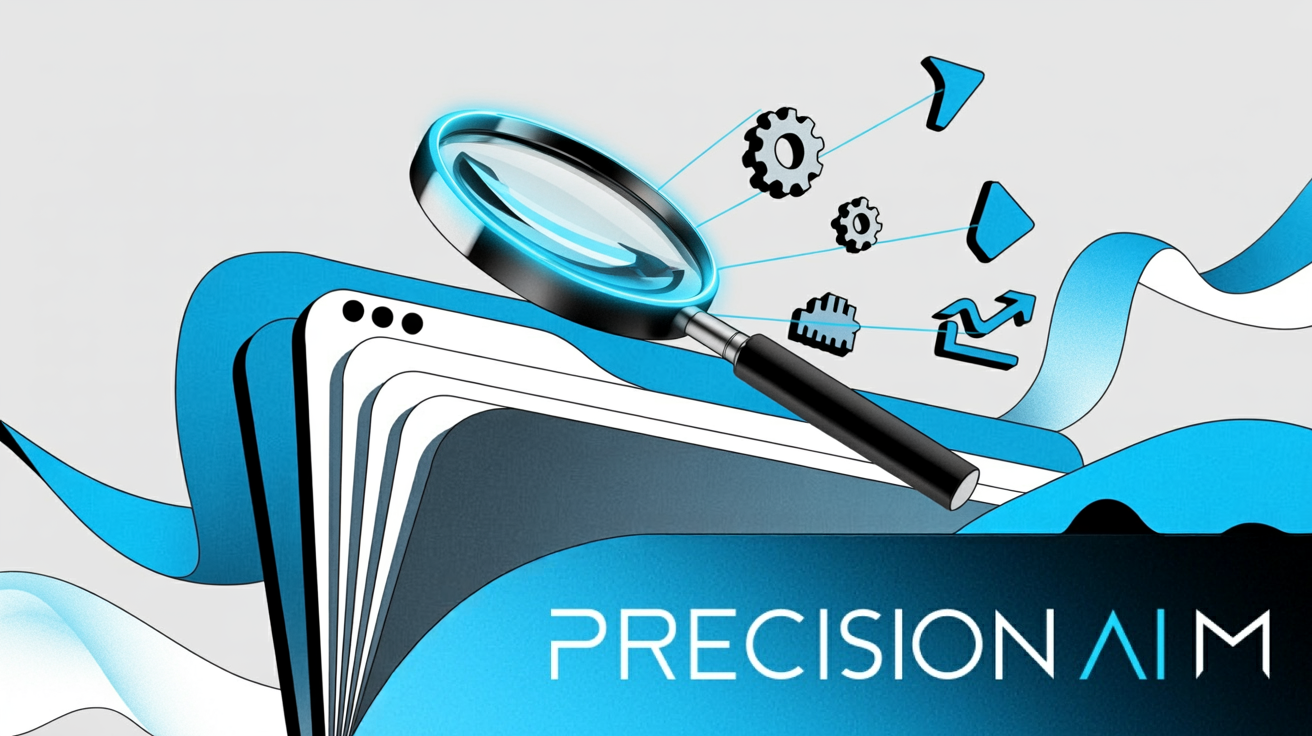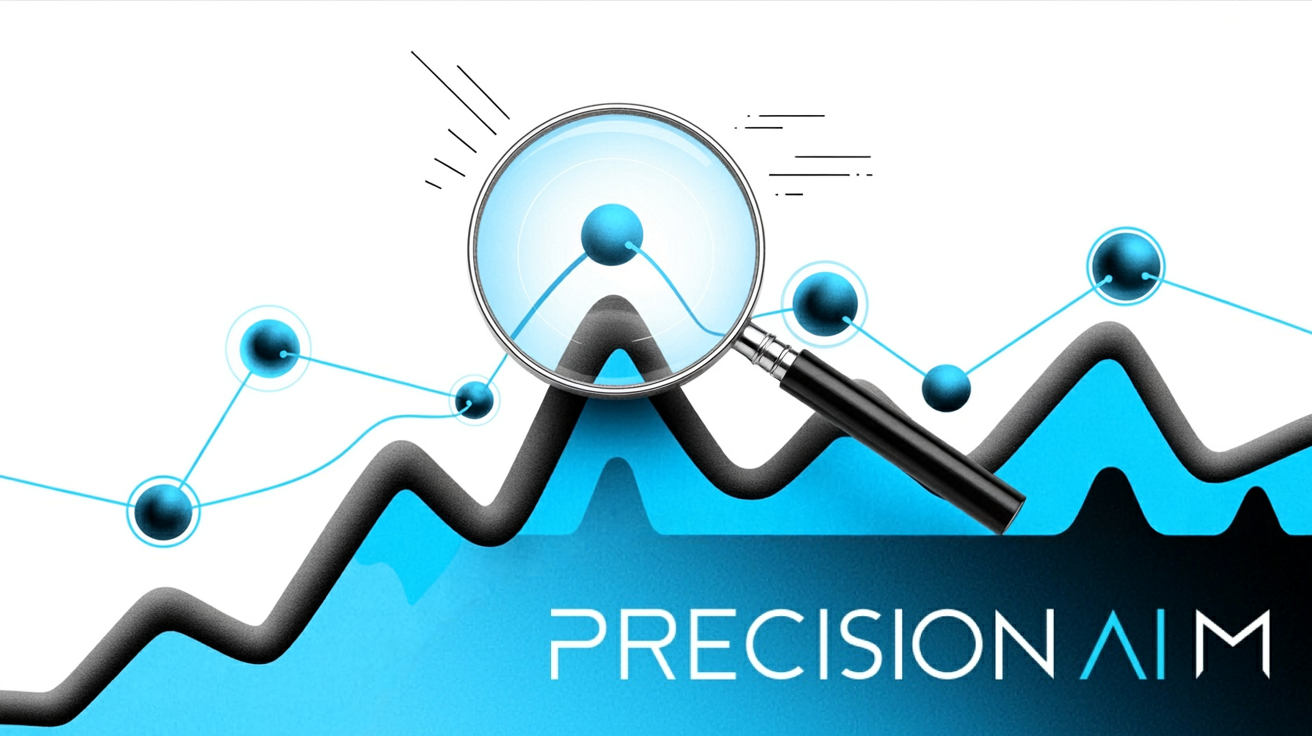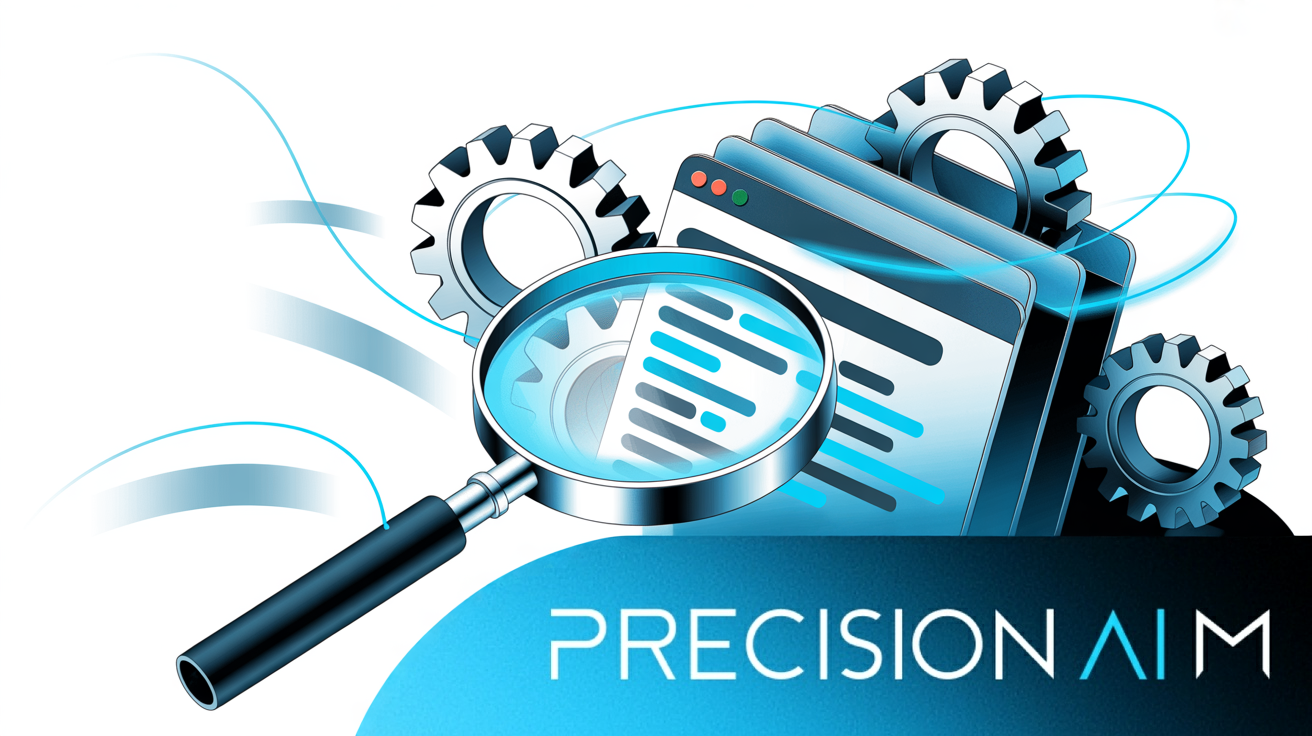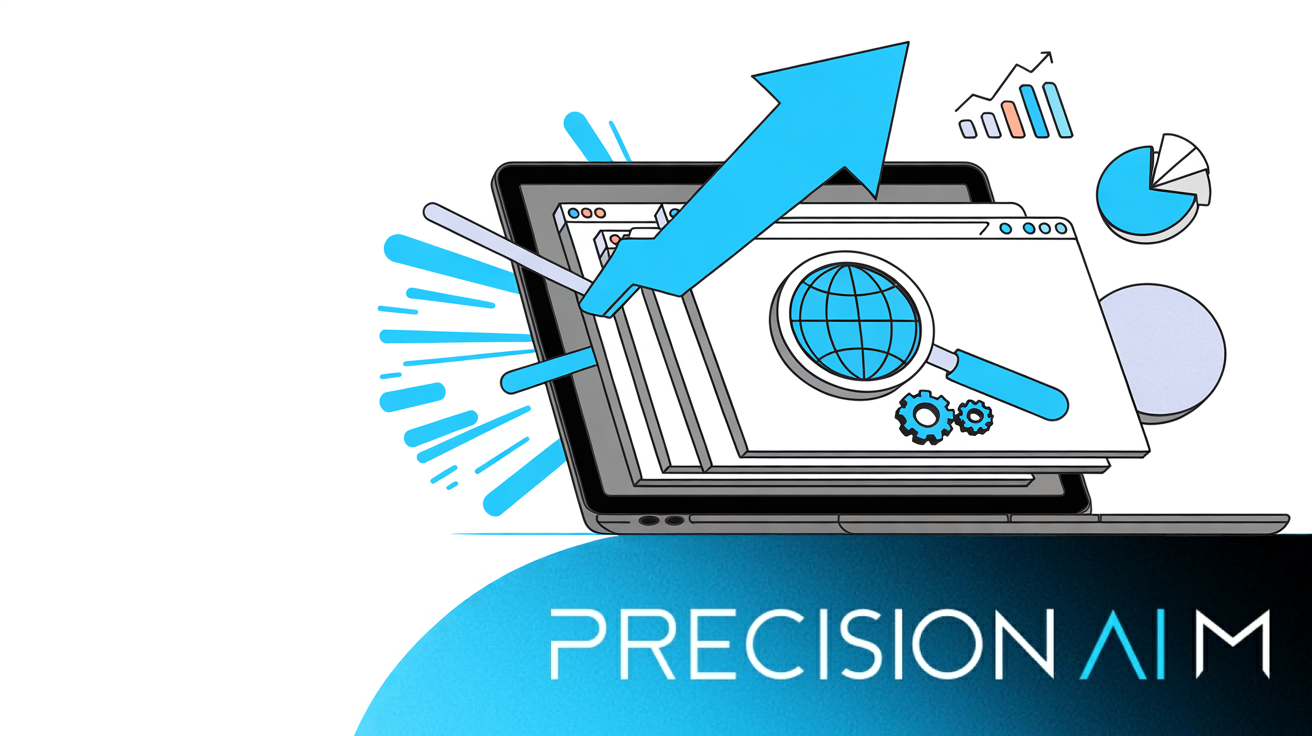Manual SEO can feel like a never-ending slog—especially when you’re juggling every other part of your business. I’ve seen small business owners spend hours wrestling with keywords, technical audits, and content updates, only to fall behind bigger competitors with more resources.
That’s where AI SEO tools come in. These platforms automate the toughest parts of SEO, from keyword research to content creation, making advanced tactics accessible even if you’re not an expert. With the right tools, you can save time, cut costs, and finally see your website climb the rankings.
In this guide, I’ll break down exactly how AI SEO tools work, which categories matter most, and how to choose the right fit for your needs. You’ll get practical examples, clear comparisons, and step-by-step advice for integrating these tools into your workflow—plus tips to avoid common pitfalls and maximise your results.
Whether you’re a solo founder or running a small team, you’ll walk away knowing how to use AI to compete online—without the overwhelm or agency price tag.
What are AI SEO tools for small business?
Defining AI SEO tools in a small business context
Let’s unpack AI SEO tools for small businesses. At their core, these are smart software platforms that use artificial intelligence to manage SEO—tasks like keyword research, content optimisation, competitor analysis, site audits, and ongoing performance tracking.
If you’ve ever struggled through spreadsheets or tried to write SEO-friendly web copy from scratch, you’ll feel the difference when you turn to AI tools. Platforms like SEMrush, SurferSEO, and Jasper AI generate keyword ideas, create content templates, and even write draft blogs—all in a fraction of the time.
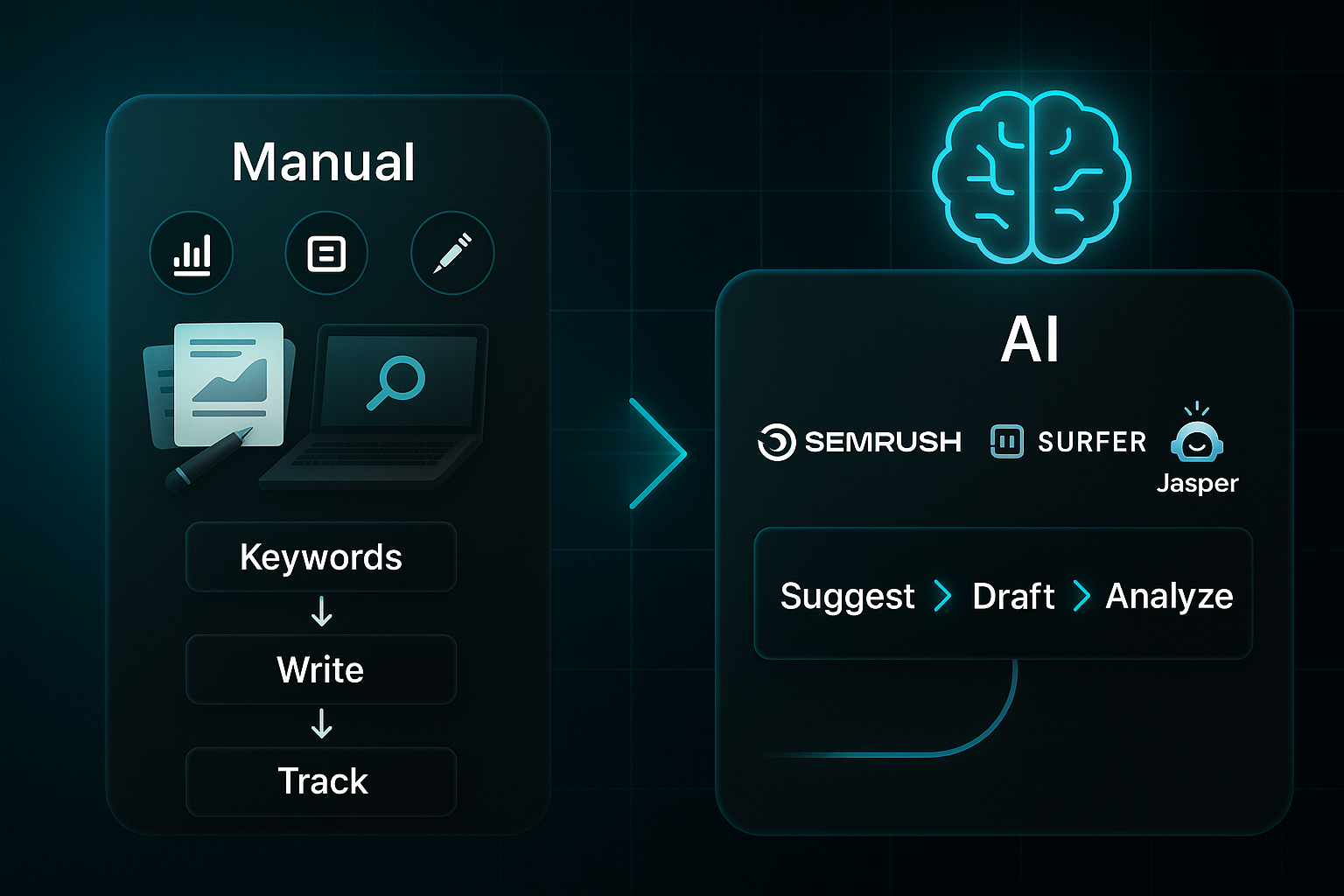
The best part? Their user-friendly design means that advanced SEO tactics are now accessible to virtually anyone—not just big companies with deep pockets. Even if your team is small or you’re working solo, you can finally compete at a higher level.
AI powered SEO tools step in, empowering small businesses to compete with larger enterprises and dominate their niche markets. These tools offer automation, precision, and insight that can transform organic search efforts into long term growth engines.
How AI SEO tools work: Key technologies and processes
So, what brings these tools to life? The magic is in the mix of machine learning, natural language processing (NLP), and predictive analytics. Machine learning scans enormous data sets, pulling out valuable keyword opportunities in moments.
NLP understands what people actually want when they search, helping the software generate content that not only ranks well but also reads naturally. Predictive analytics goes a step further, pinpointing which keywords and strategies are likely to make a real impact for your business.
Put all that together, and here’s what you get:
- Automated keyword discovery
Finds promising keywords instantly, skipping tedious manual research. - Competitor and market analysis
Quickly delivers detailed reports on what your rivals are up to. - Content creation and optimisation
Produces AI-powered drafts and instant feedback for higher rankings. - Continuous site audits
Flags technical problems and sends real-time alerts. - Performance dashboards
Simple, live updates you can understand at a glance.
Some tools run almost automatically, while others let you approve changes before they appear on your site. Either way, your SEO efforts become more efficient—and a lot less painful.
| Task | Manual SEO | AI SEO Tool Automation |
|---|---|---|
| Keyword research | Hours of spreadsheets | Automated, instant ideas |
| Content creation | Manual drafting and edits | AI drafts, real-time optimisation |
| Competitor analysis | Tedious manual reviews | Fast, comprehensive reports |
| Technical site audits | Slow, requires expertise | Automated alerts and warnings |
| Analytics/reporting | Manual data entry | Live dashboards and insights |
Unique challenges for small businesses and the value AI brings
Running a small business means juggling time, budget, and expertise. Manual SEO can feel overwhelming or simply get sidelined.
That’s where AI SEO tools really shine. They offer reliable optimisation, competitor tracking, and content scoring—no need to contract a pricey agency or spend months learning SEO yourself.
By early 2025, AI adoption among companies had surged to 72%, with 67% of small businesses specifically leveraging AI tools for marketing and SEO.
Because these tools update rapidly to keep up with SEO best practices and Google trends, you’re always current. Ultimately, AI SEO tools even the playing field, letting small businesses stand out online—no matter your resources or experience.
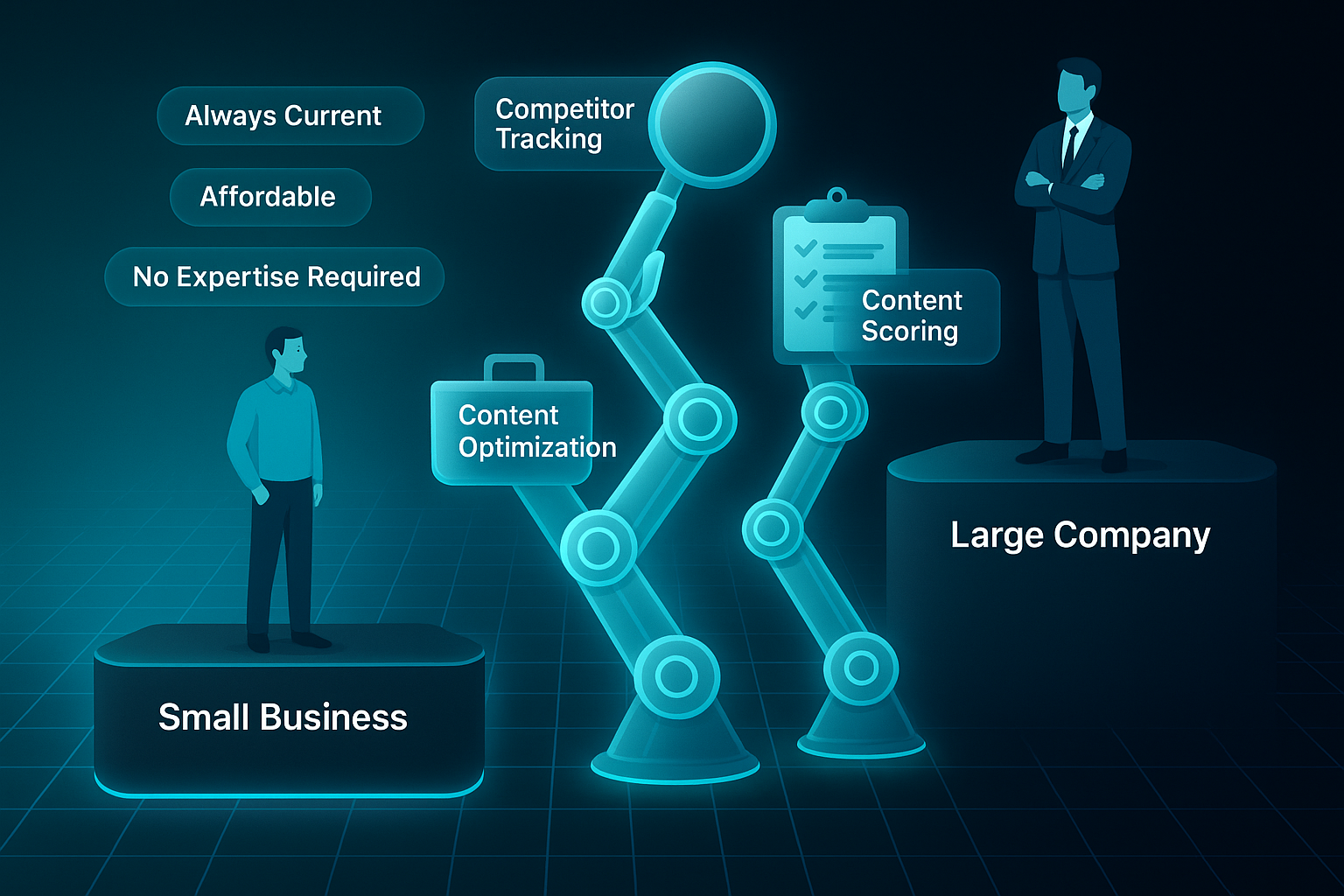
Why small businesses need AI SEO tools
AI SEO tools really are a game-changer for small businesses. The digital marketing world throws up challenge after challenge—tight budgets, fierce competition, and ever-changing search engines. For owners trying to stay afloat or hoping for growth, finding efficient ways to boost online visibility is absolutely essential.
Barriers small businesses face with traditional/manual SEO
Manual SEO puts most small businesses on uneven footing. Many simply don’t have the budget for dedicated tools, leaving their optimisation efforts limited from the outset.
You’ll rarely find a small business with an employee devoted solely to SEO. Instead, it’s often squeezed in between customer service, accounting, or ordering stock. So it’s no surprise these digital marketing tasks get done inconsistently—or not at all.
And here’s the real challenge: the SEO landscape never stands still. Search engines update algorithms and best practices all the time.
Keeping up is nearly impossible without formal training or the extra funds for courses. Hiring agencies or outside contractors? That’s a luxury most can’t afford.
The result? Many small businesses skip SEO completely and miss out on free organic traffic and new leads. This makes it tough to compete against bigger brands with specialist teams and deeper budgets.
How AI SEO tools address these challenges
This is where AI SEO tools come to the rescue. They automate technical, repetitive tasks like keyword research or site audits, freeing up valuable time for owners and staff to focus on actually running the business.
With clear dashboards and simple recommendations, even beginners can try advanced SEO strategies—no need for expensive consultants or complicated training. That daunting task of setting up a local search profile? It can now be done in minutes, with ongoing tweaks sorted automatically.
Thanks to predictive analytics, these platforms spotlight keywords and tactics proven to work. No more guesswork—just a clear path to better results.
You see the impact quickly: businesses using AI SEO tools often double their 'near me' visibility, get surges in leads or web traffic, and compete—even in crowded markets.
For many, this truly bridges the competitive gap—sometimes flipping the playing field, letting smaller players outmanoeuvre their larger rivals.
Types of AI SEO tools available for small businesses
Overview of main categories and use cases
AI SEO tools for small businesses usually fall into a few key categories: content optimisation, keyword research, technical audits, analytics, content generation, and topic research.
Each tool tackles a familiar challenge. Struggling to improve stale web pages? Content optimisation tools highlight what’s missing. Lost in keyword chaos or trying to figure out your rivals? Keyword research helps you out. Seeing odd drops in website performance? Technical audits quickly spot problems that need fixing.
Analytics platforms transform overwhelming data into simple dashboards you can actually understand. Content generation makes writing fresh blogs or service pages less of a chore. Topic research tools guide what to publish next for better results down the line.
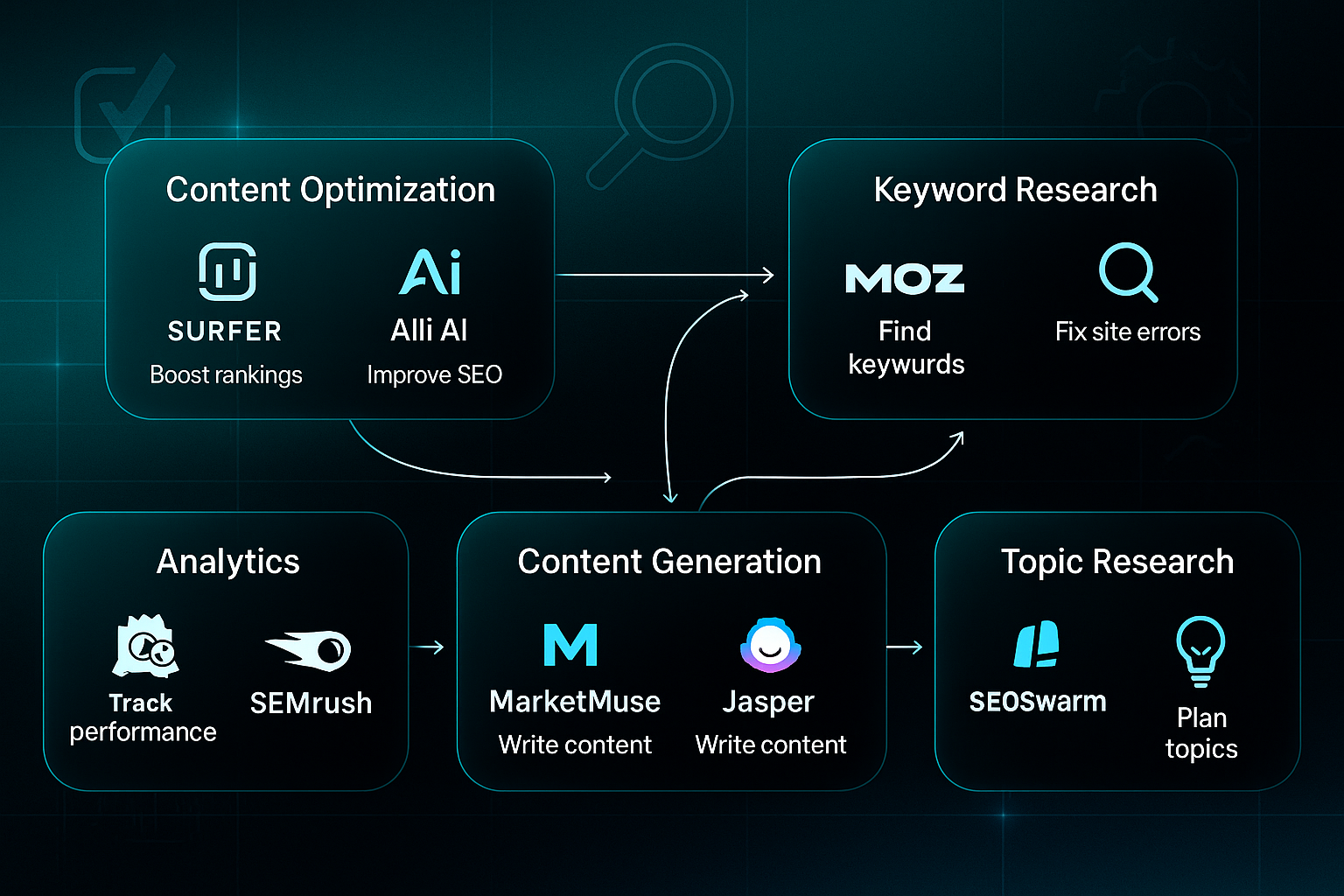
Examples of leading tools and best-fit cases
Here’s how popular tools fit their categories and use cases.
SurferSEO and Alli AI focus on content optimisation, offering specific advice to lift your site’s performance. Moz and SEMrush are your go-to for keyword research and competitor tracking. Alli AI and AIOSEO run technical audits, flagging errors automatically.
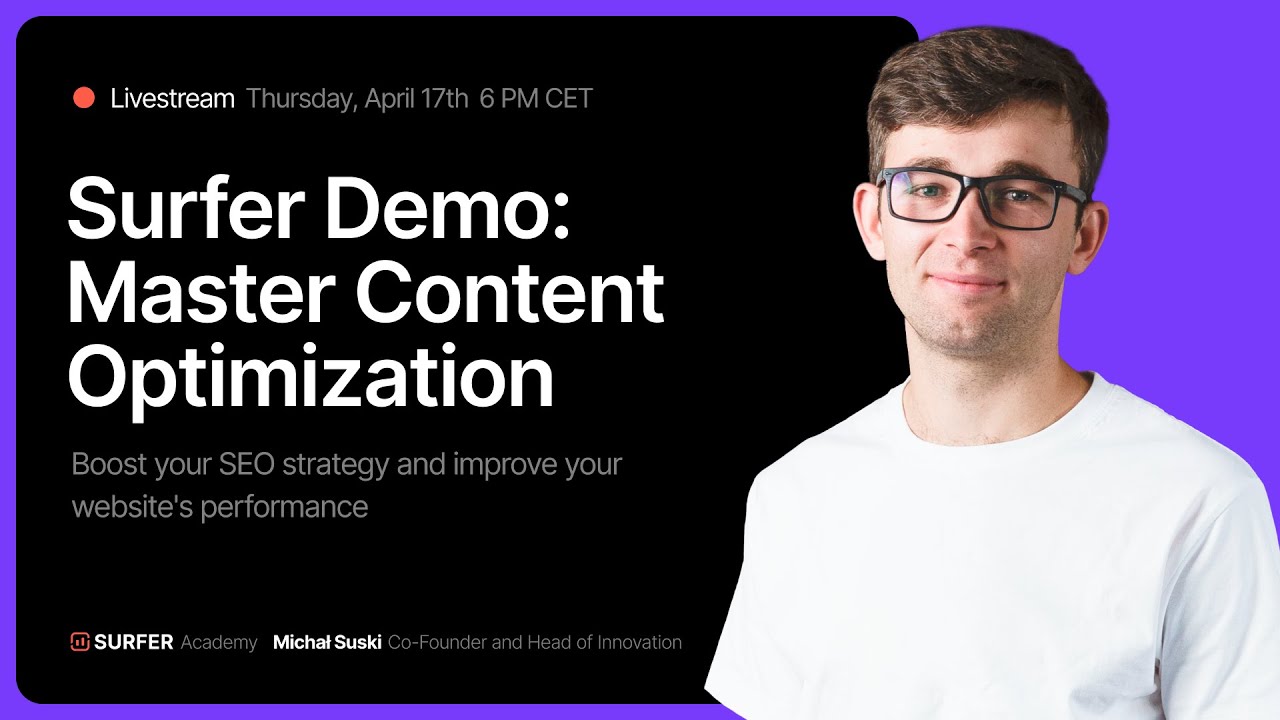
Surfer Product Demo: Master Content Optimization
When it comes to making sense of your site’s numbers, MonsterInsights and SEMrush deliver clear analytics. Jasper and SEOSwarm streamline content generation; SEOSwarm stands out by providing expert oversight for every post. Not sure what to write? MarketMuse and Ahrefs help with topic research, filling content gaps intelligently.
AI SEO tool categories at a glance
| Category | Leading Tools | Best-fit Use Case | Benefit | Limitation |
|---|---|---|---|---|
| Content Optimisation | SurferSEO, Alli AI | Improving pages/posts | Targeted suggestions | Needs a human check |
| Keyword Research | Moz, SEMrush | Finding new/local keywords | Competitor ideas, insights | May lack trend data |
| Technical Audits | Alli AI, AIOSEO | Automated health checks | Quick problem detection | Sometimes needs an expert |
| Analytics | MonsterInsights, SEMrush | Campaign tracking | Simple performance reports | Some learning required |
| Content Generation | Jasper, SEOSwarm | Producing content fast | Consistency, expert review | Human edits recommended |
| Topic Research | MarketMuse, Ahrefs | Filling content gaps | Trend/gap suggestions | Local detail can be missed |
Most tools are easy to pick up and fit right into your workflow. If you want a hands-off approach, agency-managed services like SEOSwarm give comprehensive blog SEO without being a time drain.

AI-Powered
SEO Content Strategy
See the AI platform that's replacing entire content teams
(with better results).

Choosing the right type(s) for your business
Start with your biggest SEO pain point. If producing content stalls you, choose content generation or optimisation first. Technical headaches? Try audit tools.
Plenty of options offer free trials—so there’s no pressure. Agency services suit hands-off owners, while DIY types can gradually build their own toolkit as they grow.
Core benefits of using AI SEO tools for small businesses
Key business and operational advantages
Let’s look at how AI SEO tools make life easier for small businesses—solving those daily headaches and freeing you to chase bigger goals.
They’re purpose-built for small teams: not enough hours, money, or hands, but a real drive to get results.
Time savings and increased content velocity
- Rapid automation
AI takes over keyword research, content writing, and audits—slashing manual workloads. - Scalable content output
Publish more, faster—growing reach without adding staff. - Strategic focus
Owners spend less time on SEO admin and more on what drives new business.
Just look at Storylane. By using AI for keyword research and blog optimisation, they brought in over 140 new customers and saw a 201% boost in organic traffic in six months.
Improved consistency and data-driven insights
- Standardised quality
AI helps keep quality and technical standards consistent across your whole site. - Continuous monitoring
Always-on checks catch problems early—before they become bigger issues. - Actionable analytics
Instant insights show your next best steps, so you always know how to improve.
Rocky Brands used this approach, automating meta tag optimisation and achieving a 30% increase in revenue from search, even up against tough competitors.
Cost efficiency versus agencies or in-house hires
- Lower costs
AI cuts expenses—no need for pricey SEO agencies or extra hires. - Budget reallocation
Savings can be invested in staff, stock, or other high-impact areas. - Improved ROI
More visibility and conversions, usually for less than paid advertising or manual SEO.
Workfellow made this work, increasing organic traffic 22-fold with lean, AI-powered campaigns and a careful budget.
Potential for greater scale and competitive parity
- Automated local SEO and competitor tracking
Keep an eye on rivals and new keywords—minus the manual grind. - Enterprise-level features
Advanced analytics and reports, now affordable for small businesses. - Rapid adjustment
Spot trends and act on new ranking opportunities instantly.
So, small businesses suddenly have access to speed, consistency, and scale—levels once off-limits to all but the biggest brands. That extra edge means your marketing finally packs a real punch.
Features to look for when choosing an AI SEO tool
Essential features and integration considerations
When it comes to picking an AI SEO tool for your small business, it pays to focus on what really matters: less hassle, stronger results, and a workflow that just works.
Ease of use, onboarding, and support
A simple interface is a must—nobody wants to spend ages figuring out menus. SurferSEO and ContentShake AI by SEMrush are great at guiding you through set-up, even if you’re a beginner. Fast, accessible support (like Alli AI’s live chat and help guides) keeps you moving swiftly if you get stuck.
Automation and reducing manual work
Who has time for repetitive SEO tasks? Features like Alli AI’s bulk editing, ContentShake’s article drafting, and SurferSEO’s automatic scoring mean you can double output or free up hours, instead of leaning on expensive agencies.
Analytics, reporting, and performance tracking
With real-time dashboards and customisable reports—think SEMrush and SurferSEO—you get instant clarity on rankings, traffic, and conversions. That means smart decisions are always within reach.
Quality controls (plagiarism, EEAT, human review)
Original, trustworthy content is non-negotiable. SurferSEO and SEMrush check for expertise, authority, and trust, while Jasper and Originality.ai scan for plagiarism. SEOSwarm and similar agencies even add a layer of expert review to help you hit Google’s standards.
Seamless integration with your website
Integration matters more than you’d think. Straightforward links to WordPress, Shopify, Wix, or Google Analytics (as offered by Alli AI, SurferSEO, SEMrush) make site updates and tracking effortless—no technical headaches.
Budget fit and pricing transparency
Clear pricing means no nasty surprises. SurferSEO starts at $49/month, ContentShake AI at $60/month, Alli AI’s Small Biz at $169/month. Always check what each tier includes before you buy.
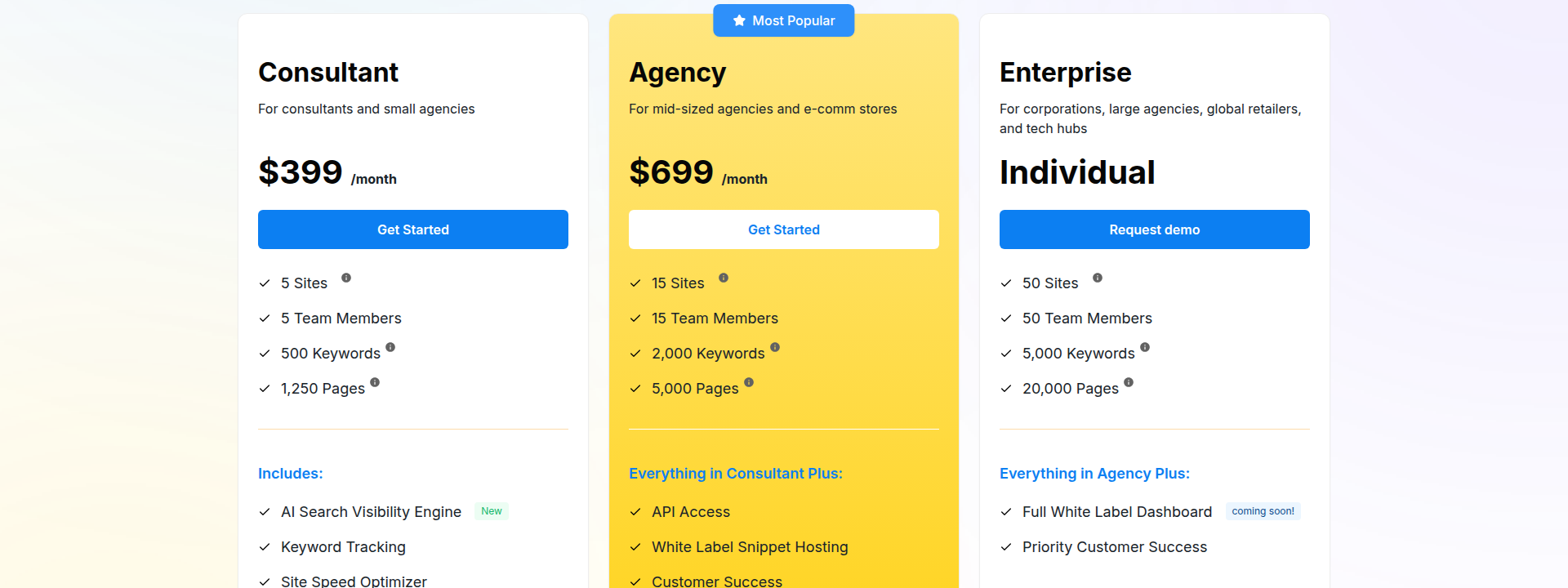
Source: alliai.com

Source: surferseo.com
Agency-managed (SEOSwarm) vs. self-serve solutions
When agency or DIY is best
SEOSwarm is ideal if you want to outsource all the heavy SEO lifting—experts handle strategy and execution, freeing up your time but costing more and reducing hands-on control.
Self-serve tools like SurferSEO or SEMrush are best for owners wanting flexibility and a more direct approach. Test demos and free trials—finding the right fit truly matters.
Common pitfalls and risks of AI SEO tools (and how to avoid them)
Quality, originality, and compliance risks: guarding against Google penalties
If you publish unchecked, low-quality, or inaccurate AI-generated content, your website could suffer real consequences. Google’s recent Core Updates are especially tough on generic AI content, meaning penalties can come quickly and unexpectedly.
This all matters even more for small or local businesses. Falling short of E-E-A-T guidelines—expertise, experience, authority, and trust—can knock your credibility and cost you search visibility. The thing is, AI struggles with local context, often missing those details that help you reach customers searching in your area.
What’s the smart move? Always have a human review your content. Fact-check everything, add your own brand’s voice and flair, and ensure your text is compliant before it goes live.
Vendor promises, feature complexity, and pricing pitfalls
You’ve probably seen the marketing hype—overnight rankings, instant results. But SMBs rarely see dramatic improvements just by adding a new AI SEO tool to their stack.
Many tools come with a learning curve sharper than expected, and a confusing mix of features you may never truly use. That low base price? It can balloon surprisingly fast with mandatory upgrades, add-ons, or hidden fees—especially if contracts or terms aren’t transparent.
Cost management and safeguarding ROI
Plenty of businesses find themselves paying for bells and whistles they never needed, or tied into restrictive agreements. Missing usage tracking or skipping regular checks can quietly drain your return on investment over time.
It pays to set clear KPIs and ROI goals before investing. Keep an eye on genuine savings—does automation lighten your load, or just add new problems that need manual fixes?
Practical strategies for safe and effective AI SEO adoption
Start small—use trial periods or pilot projects to match features to your true business needs. Ongoing staff upskilling and review checklists really do make a difference: always fact-check, add local nuances, insist on originality, inject your brand, and run plagiarism checks.
And before signing a contract, watch for unclear pricing, sneaky upgrades, restrictive cancellations, or weak support. Bring everyone into the learning process and openly share results—this way, AI SEO can be a real asset, not a risky shortcut.
Integrating AI SEO tools into your small business workflow
Step-by-step workflow for implementation
Let’s say you’re ready to bring AI SEO tools into the mix. But how do you actually blend them into your daily routine? The trick is giving your current set-up a good, honest look.
Audit content and bottlenecks
Begin with an AI-powered audit using SEMrush or SurferSEO. These tools quickly flag weak pages, missing keywords, technical issues, and the snags holding back your SEO.
- Run technical/content audits
Automated scans highlight issues and best performers. - Document workflow pain points
Note slow approvals or skill gaps.
With these pain points mapped out, you can focus your fixes where they’ll count most.
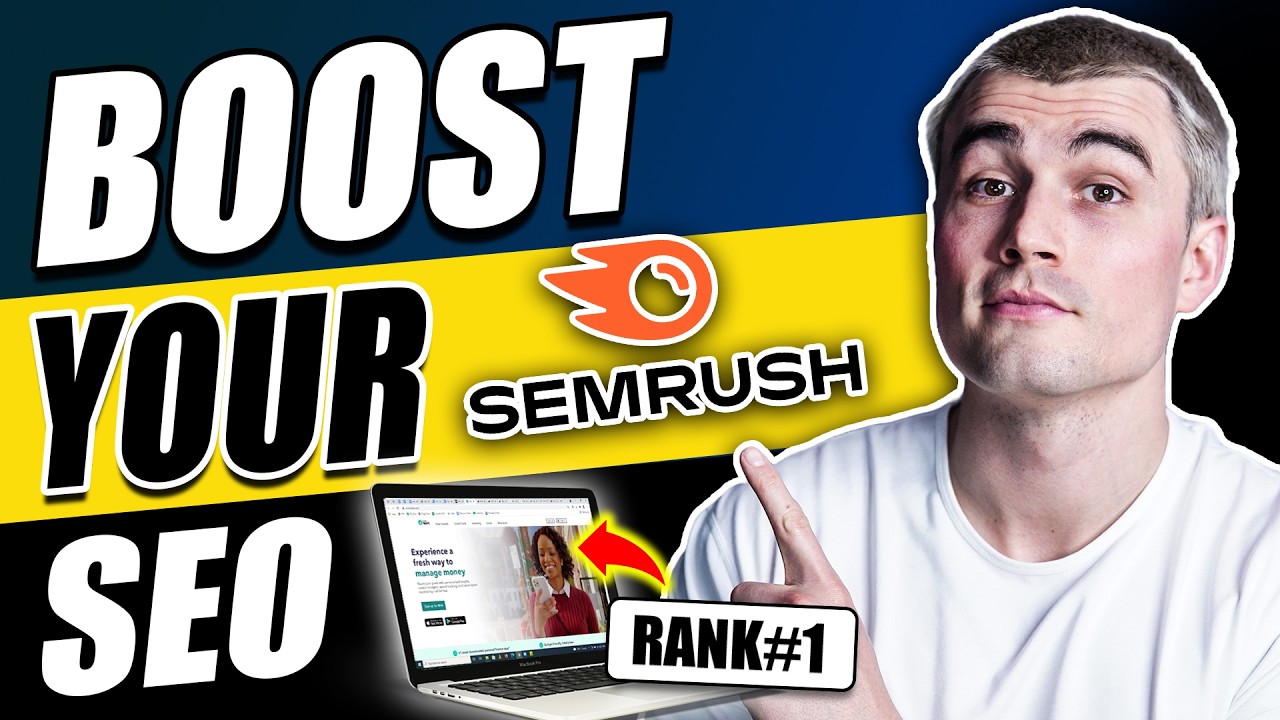
How to Do a Site Audit for Your Business Website with Semrush
Select tools fitting content types and needs
Here’s the thing—not every tool is right for every business. Choose based on your toughest challenges, whether that’s local search (Moz Local), quicker blog writing (Jasper, SEOSwarm), or better analytics (SEMrush). Make sure your choice integrates easily with your site’s CMS.
- Address priority needs
Select tools based on content, local, or analytics gaps. - Test integration and training
Verify setup with your site and team.
A quick trial is worthwhile—confirm everything works as promised before committing.
Workflow/SOP mapping
It might not sound glamorous, but mapping out your workflow is crucial. Pinpoint where each tool slots in—be it keyword research, drafting, or reviews. Assign responsibilities and keep clear step-by-steps handy for the team.
- Outline workflow and roles
Define responsibilities and steps clearly.
Team training and onboarding
Smooth onboarding is key: supply guides, use vendor resources, and appoint a go-to team lead. Centralise logins and cheat sheets so nobody gets stuck.
- Distribute logins and guides
Provide access and cheat sheets to users.
Pilot, refine, and track
Don’t roll out full-scale changes straight away. Start small, maybe with a few blog posts, track rankings and traffic, and gather team feedback.
- Pilot, measure, update
Start small, monitor results, iterate.
Keep refining as you learn. That’s how a workflow becomes both robust and realistic—without overwhelming your business.
Spotlight: Agency-managed AI SEO for small businesses (with SEOSwarm example)
How agency-managed solutions work (the SEOSwarm model)
Ever wished you could just hand off all your SEO worries and know it’s sorted? That’s precisely what agency-managed AI SEO, like SEOSwarm, offers. Instead of slogging through dashboards or constant checks, Precision AI Marketing’s team takes care of the full SEO journey—strategy, research, content, technical tweaks, and ongoing blog management.
Their hybrid model is the secret sauce. AI handles the repetitive side—keyword clustering, content drafts, and audits—while human specialists ensure the strategy lines up with your goals, edit with a fine-tooth comb, reinforce EEAT, and inject your brand’s style. The workflow kicks off with an audit and strategy, then smoothly flows through AI content creation, expert review, technical tweaks, and direct publishing (often instantly indexed via Google Search Console). All the analytics updates and content tweaks? The agency handles those, so you can actually get on with running your business, not mastering SEO.
It’s a totally different world to DIY tools—no steep learning curve, and your content stays compliant and ready to rank.
Blog-in-one-minute: Integrated, instant blog site setup
Want a blog live so fast it feels like magic? Blog-in-one-minute is an optional add-on fitting perfectly with SEOSwarm. Just drop in two lines of code—your website springs to life with an SEO-ready blog, full schema markup, and technical best practices pre-baked in. It all runs on Cloudflare for quick speeds and security.
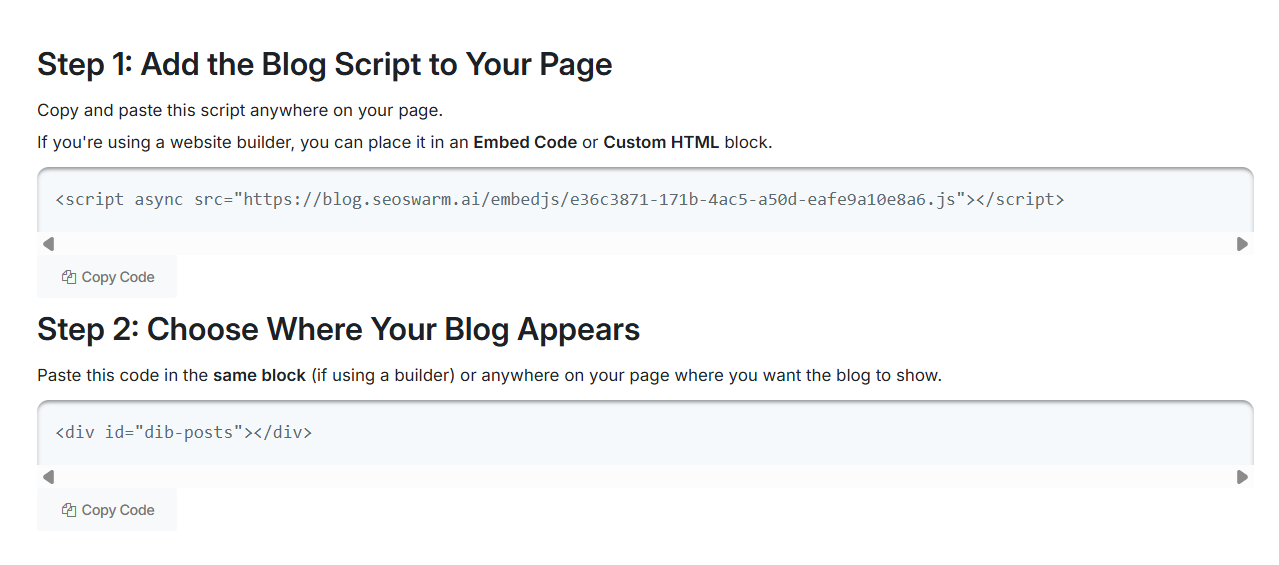
No gruelling set-up; suddenly, launching new microsites or hubs is easy. Pricing is tiered: $40/month for up to five blogs, $80 for 20, scaling up simply from there. It’s billed separately from agency management.
Blog-in-one-minute
Add a fully SEO-optimised blog to your website with just 2 lines of code.
Learn more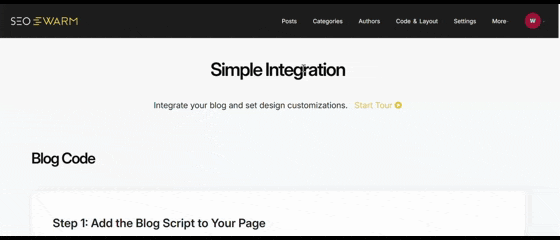
Who benefits most from an agency-managed solution
So who really wins here? If you’re a small business owner tight on time or SEO expertise—or you want results without hassle—this model is a clever shortcut. It’s a huge boost for speedy service firms, multi-site owners, or solo founders wanting enterprise-level SEO with minimal overhead.
You dodge tool overwhelm and guesswork—just hand over the reins and get scalable, professional results every month.
Comparing leading AI SEO tools for small businesses
Situational advantages and best-fit cases for each major tool
Choosing the right AI SEO tool all comes down to your business goals—and just how hands-on or automated you want things. Some owners want to let experts handle it, others relish tweaking every keyword themselves. So which tool fits where?
- SEOSwarm (Precision AI Marketing)
Agency-managed, hands-off SEO if you want expert delivery, a done-for-you blog, and no tricky tech. - SurferSEO
Real-time SERP and keyword feedback—great for direct, practical content upgrades without lots of jargon. - SEMrush
All-in-one campaign hub for research, strategy, and in-depth competitor tracking. - Ahrefs
Specialises in competitor and link analysis—a good match if you’re serious about outranking rivals. - Jasper
Makes rapid, AI-generated content—perfect for stretched teams needing more material. - Clearscope / MarketMuse
Industry leaders in semantic depth and building topic authority. - Frase / GrowthBar
Fast content briefs and automation—top pick for busy solo founders or microbusinesses. - Screaming Frog
Delivers advanced technical audits (non-AI) for marketers who like getting directly under the hood.
Guidelines for choosing the right tool for your business
Where do you start? Zero in on what slows you down—content bottlenecks, technical snags, or confusing analytics?
- Identify workflow pain points
Focus on your top SEO roadblock. - Match skills and resources
Choose a tool your team can genuinely use. - Decide on control vs. automation
Prefer full-service (SEOSwarm), or want to steer? Pick accordingly. - Check integration
It must fit your website and analytics. - Plan for scalability
Select features that’ll grow with you. - Test with trials
Demos help you try before you buy. - Use a checklist
Lean on earlier feature and risk advice to guide your pick.
The right tool gives clarity and momentum—so your small business can finally punch above its weight.
Maintaining and improving SEO performance with AI over time
Ongoing content performance management
Scheduling audits and content refreshes
Keeping your SEO strong isn’t a one-off job—it’s a rolling process. Automated audits and refreshes with tools like SurferSEO or Millimetric.ai show you which pages are stale, highlight new keyword opportunities, and uncover technical issues fast. That’s how businesses like Planable saw a 167% jump in organic traffic through regular, AI-powered content updates.
![Content Audit: Surfer’s New Product Revealed! [How to Use]](https://cdn.prod.website-files.com/67209df463dce3fd8766a5ca/69025b49d846e5053af4f9ed_maxresdefault.jpeg)
Content Audit: Surfer’s New Product Revealed! [How to Use]
Using analytics to spot and fix underperformance
But what if something starts slipping? AI dashboards linked with Google Analytics will instantly flag underperforming content. Millimetric.ai, for example, sends real-time alerts about broken links or index drops, keeping you ahead of costly setbacks before they spiral.
Blending AI-suggested updates with human review
Yet, there’s no beating a human sense check. Someone on your team should always review AI’s suggestions—checking for brand consistency, local relevance, and compliance—before anything goes live.
Google has confirmed that content produced using artificial intelligence should undergo a human review process, highlighting the necessity of human oversight for maintaining quality standards.
Agency maintenance (as with SEOSwarm) for long-term optimisation
If you’d rather not juggle updates yourself, agency-managed services like SEOSwarm oversee everything: audits, updates, analytics, and expert editing. This hands-off cycle allows you to focus on your business while your SEO keeps performing.
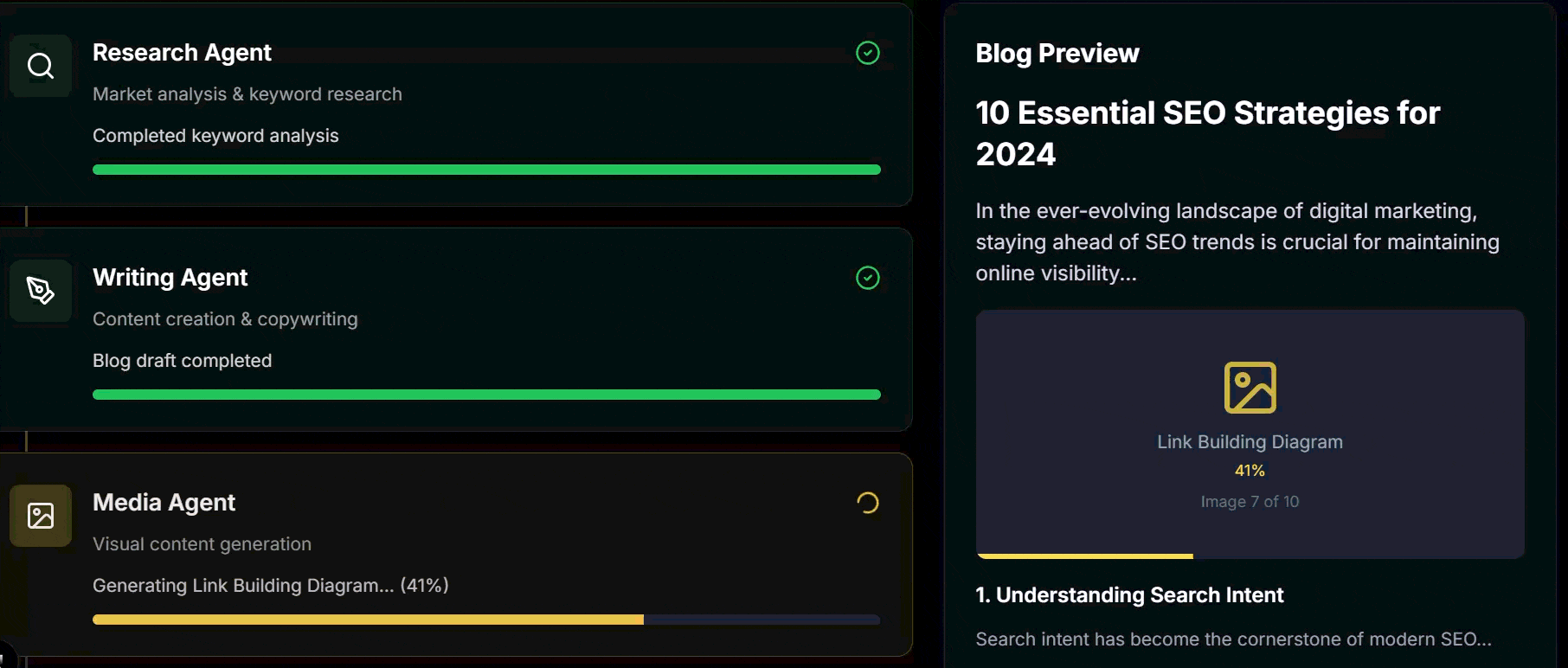
AI-driven SEO management works best as a loop—audits drive updates, analytics reveal new opportunities, human review keeps things sharp, and agencies can orchestrate the whole process. It’s this ongoing rhythm that keeps small businesses visible, current, and competitive as the digital landscape evolves.
Making AI SEO Tools Work for Small Business
Small businesses finally have a real shot at competing online—not by working harder, but by working smarter with AI SEO tools. The real advantage isn’t just automation; it’s the ability to focus your limited time and budget where they matter most, while AI handles the heavy lifting.
Here’s my advice: Start by pinpointing your biggest SEO bottleneck—be it content, technical issues, or analytics. Test a few tools with free trials, map out a simple workflow, and always layer in human review for quality and compliance. If you’d rather skip the learning curve, agency-managed solutions like SEOSwarm can deliver results without the hassle.
SEO isn’t a set-and-forget task. The businesses that win are those that keep refining their approach, blending AI efficiency with human insight. In the end, the smartest move is to treat AI SEO as your ally—one that helps your business punch above its weight, every single day.
- Wil
